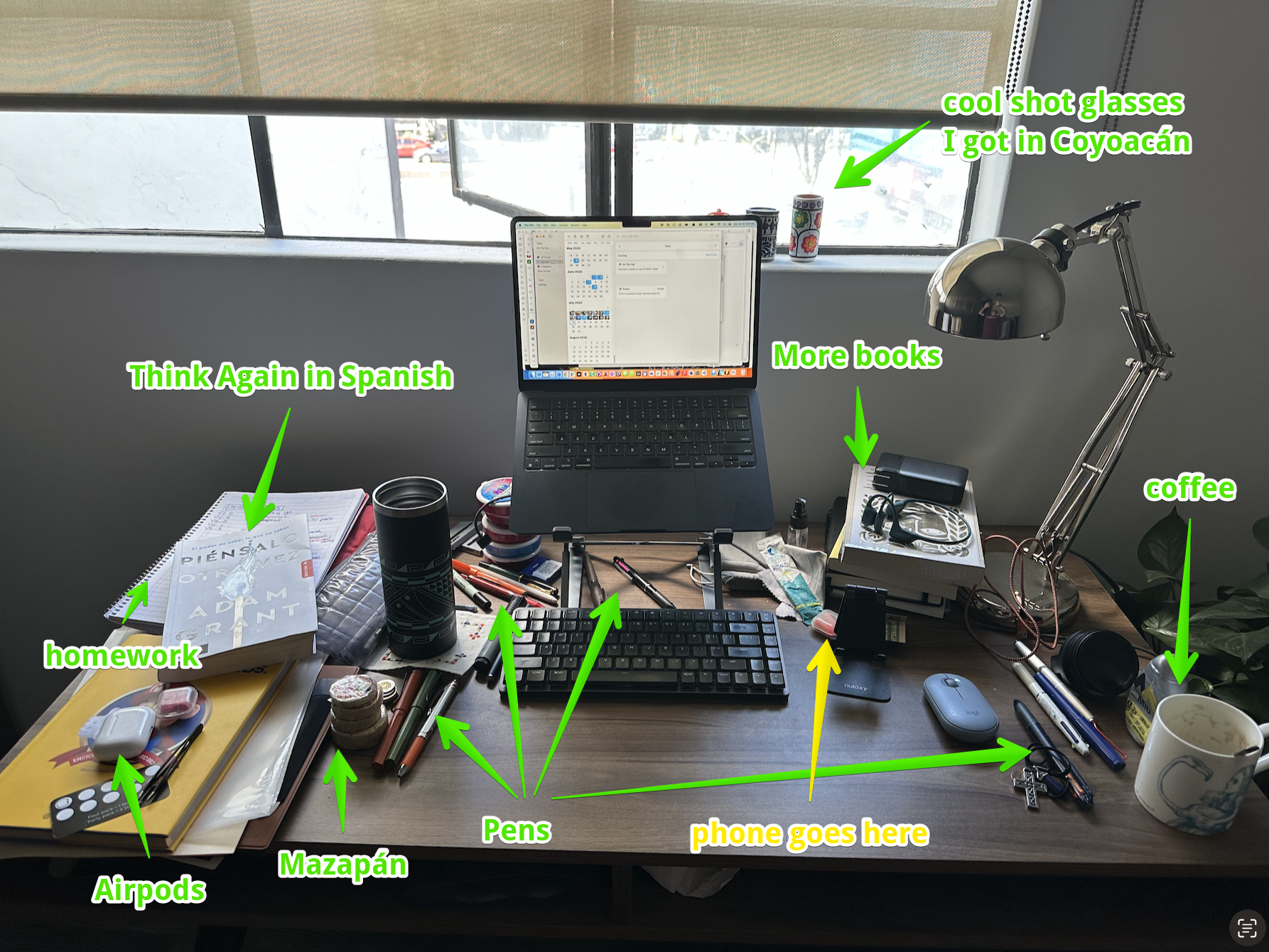I am hoping for a slow day today. Instead of a Selfie, I decided to take a snapshot of my work area.

The laptop, keyboard, and mouse are pretty obvious. But yeah, this is how I work. I'm not one of those super neat freaks. Actually forget, super, or freak. Just neat would be nice.
New Understanding
This morning, I was working on going through translating some more phrases. While my Spanish continues to improve, I still get absolutely stumped by some simple sounding phrases.
Here is one from Piénsalo Otra Vez:
El riesgo es que acabemos tan obsesionados con predicar que tenemos razón
This sentence translates into:
The risk is that we end up so obsessed with preaching that we think we are right.
Now, as a language learner, here's the interesting thing... "that we think we are right" is captured by the words "que tenemos razón"
Here's the interesting thing - the word "think" is not in there. When I'm doing translations ChatGPT, and my teachers are constantly warning me that context matters. I'm like yeah, yeah, but this example really brought it home.
Why?
Tener razón - is most commonly translated as "to be right" but in this context it means to think we are right. That is a pretty substantial difference in meaning, in fact it almost completely inverts the meaning right? If I am right, then I am correct, but if I only think I'm right, then I might be wrong (and probably am). That is a non-trivial shift in meaning.
So how did the Spanish get to this result?
In English, we have a a relatively limited set of verb conjugations. Spanish in contrast as a ridiculously rich set of verb conjugations. One example is that in English we must include the subject or you won't know who I'm talking about:
- I ran
- She ran
- He ran
- We ran
- They ran
But in Spanish, the verb (usually) tells you who the subject is
- (Yo) corro
- (Tu) corres
- (El/ella/usted) corre
- (Nosotros) corremos
- (Ellos/ellas/ustedes) corren
Looking at WordRefence.com, there are (at least) 18 categories of conjugations. This gives español a RICH set of subtle (and not so subtle) differences in meaning. So what?
So... in English we often add words to create subtlety. Let's look at that sentence again.
The risk is that we end up so obsessed with preaching that we think we are right
The first half of the sentence is laying the groundwork for setting the idea that there is a risk we could end up somewhere we don't want to be. But we need to add the words "think" to adjust the phrase "we are right", and change its meaning (we only think we are right)
But in Spanish... You can take an idea like "we are right", and by context alone change its meaning, introducing doubt through implication.
El riesgo es que acabemos tan obsesionados con predicar que tenemos razón
The first half of the sentence (that risk is that we end up so obsessed that...) conveys information needed to understand to the second half of the sentence. Spanish does not need to add the word "think" to "we are right" to change it. That idea is implied by the context.
This of course, is totally weird to me. I say all the time (in English) that Words Matter. Well, in Spanish it appears that "context" matters more than the words. Without the context you may not know what the other person is actually saying. Worse still, if you rely on word-by-word translations - you can (and I frequently do) misunderstand what is being said.
Here's how ChatGPT phrased it.
Spanish relies heavily on verb conjugations to convey subtle shades of meaning, while English often employs additional words or constructions to achieve similar effects
Or the TLDR;
Spanish, verb conjugations play a significant role in conveying meaning, including nuances of mood, tense, and condition. Spanish has a rich system of conjugations, which allows for more precise expression of ideas compared to English.
The specific conjugation of a verb can carry important information about the speaker's attitude, subjective perception, doubt, hypothetical situations, or potential outcomes. Different tenses and moods in Spanish, such as the subjunctive imperfect or conditional, are used to express varying levels of probability, uncertainty, desire, obligation, and hypothetical scenarios.
English, on the other hand, relies more on additional wording or auxiliary verbs to express similar nuances that are conveyed through verb conjugations in Spanish. English tends to use a combination of words, auxiliary verbs, adverbs, and context to clarify the intended meaning.
This is one of my biggest stumbling blocks to listening and reading comprehension. It also inhibits how I express myself, but that is not as critical. I just sound more American than a native speaker. I struggle when a verb or phrase implies and changes the meaning of subsequent words and phrases. I'm used to the idea in English that I have to add more words to modify meaning - but in some (many?) situations with Spanish this is not the case.
I keep collecting little phrases like this in my notebook. I want all the words to spell out the idea clearly, but Spanish seems to have a lot more subtle interaction and implication. When I ask my teachers at school why something means what it means, I hear the word, "implicit" or "implies" a lot when they answer.
Today's plans
Chill, Study, play some Zelda. Find some cheese to make more sandwiches. It was nice waking up this morning and not needing to take two Advil.



